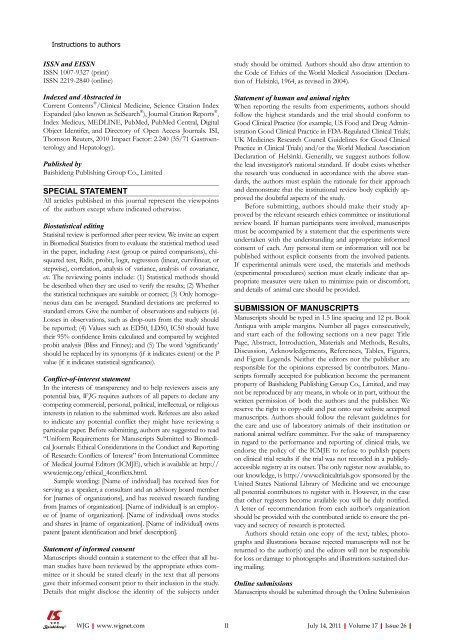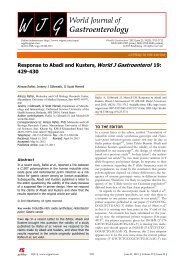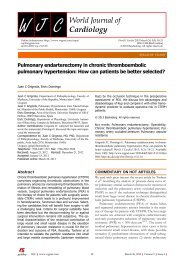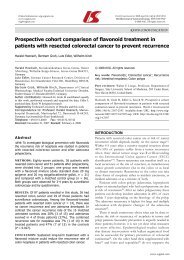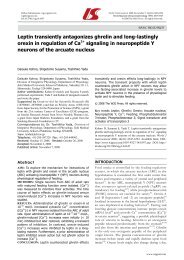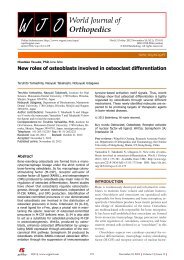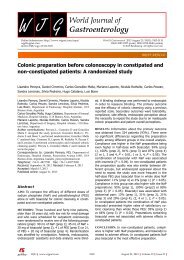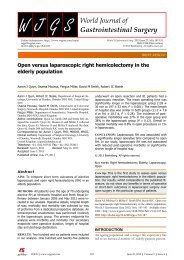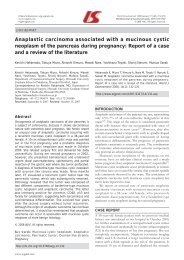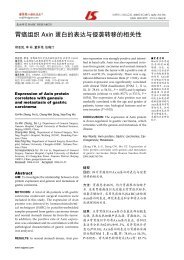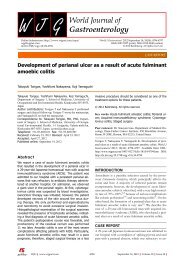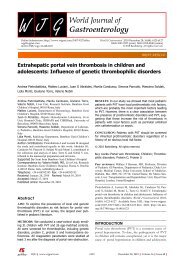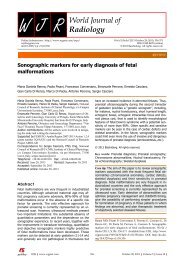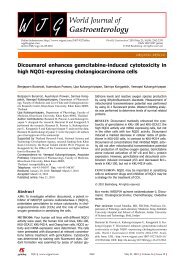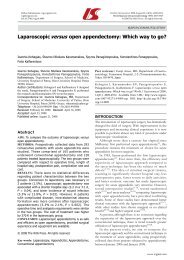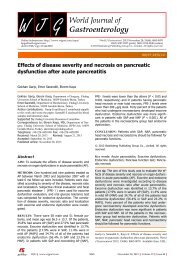26 - World Journal of Gastroenterology
26 - World Journal of Gastroenterology
26 - World Journal of Gastroenterology
You also want an ePaper? Increase the reach of your titles
YUMPU automatically turns print PDFs into web optimized ePapers that Google loves.
Instructions to authors<br />
ISSN and EISSN<br />
ISSN 1007-9327 (print)<br />
ISSN 2219-2840 (online)<br />
Indexed and Abstracted in<br />
Current Contents ® /Clinical Medicine, Science Citation Index<br />
Expanded (also known as SciSearch ® ), <strong>Journal</strong> Citation Reports ® ,<br />
Index Medicus, MEDLINE, PubMed, PubMed Central, Digital<br />
Object Identifer, and Directory <strong>of</strong> Open Access <strong>Journal</strong>s. ISI,<br />
Thomson Reuters, 2010 Impact Factor: 2.240 (35/71 <strong>Gastroenterology</strong><br />
and Hepatology).<br />
Published by<br />
Baishideng Publishing Group Co., Limited<br />
SPECIAL STATEMENT<br />
All articles published in this journal represent the viewpoints<br />
<strong>of</strong> the authors except where indicated otherwise.<br />
Biostatistical editing<br />
Statisital review is performed after peer review. We invite an expert<br />
in Biomedical Statistics from to evaluate the statistical method used<br />
in the paper, including t-test (group or paired comparisons), chisquared<br />
test, Ridit, probit, logit, regression (linear, curvilinear, or<br />
stepwise), correlation, analysis <strong>of</strong> variance, analysis <strong>of</strong> covariance,<br />
etc. The reviewing points include: (1) Statistical methods should<br />
be described when they are used to verify the results; (2) Whether<br />
the statistical techniques are suitable or correct; (3) Only homogeneous<br />
data can be averaged. Standard deviations are preferred to<br />
standard errors. Give the number <strong>of</strong> observations and subjects (n).<br />
Losses in observations, such as drop-outs from the study should<br />
be reported; (4) Values such as ED50, LD50, IC50 should have<br />
their 95% confidence limits calculated and compared by weighted<br />
probit analysis (Bliss and Finney); and (5) The word ‘significantly’<br />
should be replaced by its synonyms (if it indicates extent) or the P<br />
value (if it indicates statistical significance).<br />
Conflict-<strong>of</strong>-interest statement<br />
In the interests <strong>of</strong> transparency and to help reviewers assess any<br />
potential bias, WJG requires authors <strong>of</strong> all papers to declare any<br />
competing commercial, personal, political, intellectual, or religious<br />
interests in relation to the submitted work. Referees are also asked<br />
to indicate any potential conflict they might have reviewing a<br />
particular paper. Before submitting, authors are suggested to read<br />
“Uniform Requirements for Manuscripts Submitted to Biomedical<br />
<strong>Journal</strong>s: Ethical Considerations in the Conduct and Reporting<br />
<strong>of</strong> Research: Conflicts <strong>of</strong> Interest” from International Committee<br />
<strong>of</strong> Medical <strong>Journal</strong> Editors (ICMJE), which is available at: http://<br />
www.icmje.org/ethical_4conflicts.html.<br />
Sample wording: [Name <strong>of</strong> individual] has received fees for<br />
serving as a speaker, a consultant and an advisory board member<br />
for [names <strong>of</strong> organizations], and has received research funding<br />
from [names <strong>of</strong> organization]. [Name <strong>of</strong> individual] is an employee<br />
<strong>of</strong> [name <strong>of</strong> organization]. [Name <strong>of</strong> individual] owns stocks<br />
and shares in [name <strong>of</strong> organization]. [Name <strong>of</strong> individual] owns<br />
patent [patent identification and brief description].<br />
Statement <strong>of</strong> informed consent<br />
Manuscripts should contain a statement to the effect that all human<br />
studies have been reviewed by the appropriate ethics committee<br />
or it should be stated clearly in the text that all persons<br />
gave their informed consent prior to their inclusion in the study.<br />
Details that might disclose the identity <strong>of</strong> the subjects under<br />
WJG|www.wjgnet.com<br />
study should be omitted. Authors should also draw attention to<br />
the Code <strong>of</strong> Ethics <strong>of</strong> the <strong>World</strong> Medical Association (Declaration<br />
<strong>of</strong> Helsinki, 1964, as revised in 2004).<br />
Statement <strong>of</strong> human and animal rights<br />
When reporting the results from experiments, authors should<br />
follow the highest standards and the trial should conform to<br />
Good Clinical Practice (for example, US Food and Drug Administration<br />
Good Clinical Practice in FDA-Regulated Clinical Trials;<br />
UK Medicines Research Council Guidelines for Good Clinical<br />
Practice in Clinical Trials) and/or the <strong>World</strong> Medical Association<br />
Declaration <strong>of</strong> Helsinki. Generally, we suggest authors follow<br />
the lead investigator’s national standard. If doubt exists whether<br />
the research was conducted in accordance with the above standards,<br />
the authors must explain the rationale for their approach<br />
and demonstrate that the institutional review body explicitly approved<br />
the doubtful aspects <strong>of</strong> the study.<br />
Before submitting, authors should make their study approved<br />
by the relevant research ethics committee or institutional<br />
review board. If human participants were involved, manuscripts<br />
must be accompanied by a statement that the experiments were<br />
undertaken with the understanding and appropriate informed<br />
consent <strong>of</strong> each. Any personal item or information will not be<br />
published without explicit consents from the involved patients.<br />
If experimental animals were used, the materials and methods<br />
(experimental procedures) section must clearly indicate that appropriate<br />
measures were taken to minimize pain or discomfort,<br />
and details <strong>of</strong> animal care should be provided.<br />
SUBMISSION OF MANUSCRIPTS<br />
Manuscripts should be typed in 1.5 line spacing and 12 pt. Book<br />
Antiqua with ample margins. Number all pages consecutively,<br />
and start each <strong>of</strong> the following sections on a new page: Title<br />
Page, Abstract, Introduction, Materials and Methods, Results,<br />
Discussion, Acknowledgements, References, Tables, Figures,<br />
and Figure Legends. Neither the editors nor the publisher are<br />
responsible for the opinions expressed by contributors. Manuscripts<br />
formally accepted for publication become the permanent<br />
property <strong>of</strong> Baishideng Publishing Group Co., Limited, and may<br />
not be reproduced by any means, in whole or in part, without the<br />
written permission <strong>of</strong> both the authors and the publisher. We<br />
reserve the right to copy-edit and put onto our website accepted<br />
manuscripts. Authors should follow the relevant guidelines for<br />
the care and use <strong>of</strong> laboratory animals <strong>of</strong> their institution or<br />
national animal welfare committee. For the sake <strong>of</strong> transparency<br />
in regard to the performance and reporting <strong>of</strong> clinical trials, we<br />
endorse the policy <strong>of</strong> the ICMJE to refuse to publish papers<br />
on clinical trial results if the trial was not recorded in a publiclyaccessible<br />
registry at its outset. The only register now available, to<br />
our knowledge, is http://www.clinicaltrials.gov sponsored by the<br />
United States National Library <strong>of</strong> Medicine and we encourage<br />
all potential contributors to register with it. However, in the case<br />
that other registers become available you will be duly notified.<br />
A letter <strong>of</strong> recommendation from each author’s organization<br />
should be provided with the contributed article to ensure the privacy<br />
and secrecy <strong>of</strong> research is protected.<br />
Authors should retain one copy <strong>of</strong> the text, tables, photographs<br />
and illustrations because rejected manuscripts will not be<br />
returned to the author(s) and the editors will not be responsible<br />
for loss or damage to photographs and illustrations sustained during<br />
mailing.<br />
Online submissions<br />
Manuscripts should be submitted through the Online Submission<br />
II July 14, 2011|Volume 17|Issue <strong>26</strong>|


